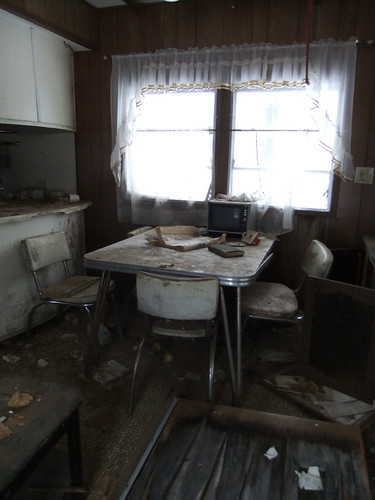The first time I came across this trailer in Baraboo, Wisconsin I learned a valuable lesson. Always, always, always check your camera batteries before leaving the house. The battery in my main camera was completely dead on arrival. To make matters worse, my trusty backup camera was also toast. I had to settle with shooting with the iPhone 3G’s s*** camera the first time. I invested in a car charger for my camera batteries after that horrible experience.
Two months later I returned to the trailer and it had deteriorated rapidly. The cold Wisconsin snow had widened the gaping ceiling hole in the kitchen. The nails that held the front door to the frame had lost their grip, exposing the dining and kitchen room to the deep nightly cold. The woodwork had absorbed much of the moisture from the brief thaw from the days prior. Black mold had begun to overtake the white kitchen lining. Everything of interest that I wanted to photograph from my first trip was where I had left it.
The family that lived in this two bedroom trailer must have been able to speak multiple languages. An edition of the Chicago Tribune on the dining room table from the late 1970’s mentions the new Star Wars movie. In one of the cupboards sat German literature. Pieces of paper with an eastern European language were also among the debris.
Translation:
Hearts of Children
Four Stories from M. Lenk
Second Edition
Zwickau i.S.
Print(ed) and Publish(ed) by Johannes Herrmann
Als ich dieses Buch in meiner gefrören Hand gehalten habe, habe ich an Wisconsins Geschichte gedacht. Die deutschen Siedler dieses Staates waren sehr wichtig. Die Bauer und die Brauer haben Wisconsin als den sogennanten “Dairy State” gegründet. Einmal in Wisconsin war es normal Deutsch zu sprechen, lesen, und schreiben. Aber das ist nicht mehr den Fall.
(Feel free help me improve my German in the comments.)
As I held this book in my frozen Hand, I thought about Wisconsin’s history. The German settlers of this state were very important. The farmers and brewers laid the foundation for Wisconsin to be called the “Dairy State.” It was normal once in Wisconsin to speak, read, and write in German. Due to the course of history, American speakers of German began avoiding using the language in everyday use in the mid-1900’s. It is a shame really, because Wisconsin still retains much of its rich German cultural heritage.





